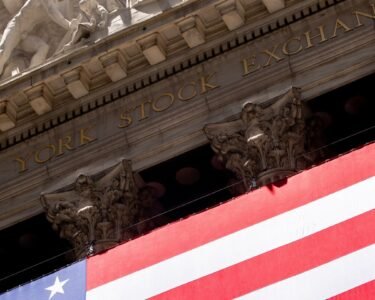Corporate bond markets may have been more measured than stock markets during the recent turbulence but it does not mean they have been calm.
High yield corporate bonds in particular have felt the impact of President Donald Trump’s “liberation day”, with spreads widening dramatically from late March. They have been gradually narrowing since mid-April, but the market remains jumpy.
For investment grade bonds, the spike has been far less acute. Spreads briefly widened in April, but only to a similar level to that seen 12 months previously and far less than in previous spikes such as October 2022 and October 2023.
However, corporate bond prices have also been hit by the volatility in government bond markets, with uncertainty over US debt levels and inflation creating difficulties for bond investors around the globe.
There has been a notable disparity in performance across different regions. The average sterling corporate bond fund is up 1.3 per cent for the year to date, having risen 2.6 per cent in 2024, while European corporate bonds have been strongest, up 2.7 per cent for this year, after an anaemic year in 2024 (up just 0.2 per cent).
The notable outlier has been the US, where the average corporate bond fund has dropped 4.4 per cent for the year to date, with weakness exacerbated by the decline in the dollar.
What is next for corporate bonds?
After their brief wobble, spreads for both investment grade and high yield are back down to pre-crisis levels, yet Moody’s predicts the global default rate could hit 8 per cent within the next 12 months as tariffs start to impact the global economy.
There are concerns low spreads do not leave enough room for any deterioration in the economic outlook.
The risk-reward looks far better in credit, especially given relatively high all-in yields
Gordon Shannon, manager on the TwentyFour Corporate Bond fund, admits there could be some areas of weakness, but is generally upbeat: “We could see some sector-specific issues, retailers with large foreign cost bases, for example, that investors could diversify away from or not play in at all, but all things considered we would not expect a mild recession, if it happens, to drive a large default cycle in the US.”
He says a zero per cent growth environment should be OK for credit given the quality of corporate balance sheets coming into 2025.
He says there is far less optimism priced into the corporate bond market than for equities, pointing out the S&P 500 index is implying double-digit earnings growth on a 21x forward multiple, “So to us the risk-reward looks far better in credit, especially given relatively high all-in yields.”
Equally, he still prefers credit to government bonds.
Europe should be calmer
Nevertheless, there are nuances. Most fund managers are favouring Europe over the US. Europe should be calmer, valuations are more attractive, and there have been relatively fewer downgrades.
Shannon adds there are also far fewer inflationary pressures in Europe, and further rate cuts from the European Central Bank are possible.
We opted to focus on bottom-up sector and security selection, rather than taking any directional risk
Colin Finlayson, fund manager on the Aegon Strategic Bond fund, agrees and says this has already contributed to fund performance: “Our preference for European over US corporate bonds was additive, over the first quarter, as the relative improvement in the European economic outlook supported credit risk in this region.”
They are maintaining a security by security approach: “With the compressed level of credit spreads, we opted to focus on bottom-up sector and security selection, rather than taking any directional risk or ‘credit beta’.”
He says there are worries about recession risk and low credit spreads: “This favours a bias towards a lower overall level of credit risk/beta to protect against any further macro or volatility shocks. Careful security selection is clearly essential from a risk management perspective but there are still also opportunities to add value.”
As well as the group’s preference for Europe, they prefer financials over non-financials.
Richard Woolnough, manager on the M&G Optimal Income fund, says the recent volatility has created some selected opportunities, adding, “In investment grade, we took advantage of market volatility to invest in high-quality companies whose valuations had significantly adjusted, with some even reflecting recessionary conditions.
“We also capitalised on market volatility to incrementally increase our risk exposure, briefly reaching 15 per cent before we trimmed exposure back towards 12 per cent as spreads tightened.”
Exerting pressure
We would still argue this is an environment requiring a capable manager with sound credit analysis skills.
This is still an environment where economic conditions could worsen, particularly in the US. Borrowing costs are likely to remain higher than expected — again, especially in the US.
It is inevitable this will exert pressure on some companies, even if, in aggregate, default levels remain low.
This is true in the high yield market in particular. A good fund manager should be able to navigate the unpredictability.

How lower UK rates could impact the bond market
For example, Mike Scott, manager on Man High Yield Opportunities, has a unique process that has seen him navigate difficult periods for the wider high yield sector. He remains a good example of a manager who can transcend the fortunes of a high asset class.
We would also put Anthony Smouha, manager of the GAM Star Credit Opportunities fund, into this bucket. He invests in the so-called junior debt of investment grade companies. This allows the fund to generate a good income, whilst still keeping a high-quality portfolio.
It is worth remembering that over a single year, the gap between the best and worst-performing sterling corporate bond fund is 14.6 per cent.
The all-in yield for corporate bonds may be high, but spread levels leave little wriggle room and their performance in the immediate aftermath of “liberation day” shows there is some vulnerability there.
Darius McDermott is managing director of Chelsea Financial Services and FundCalibre












